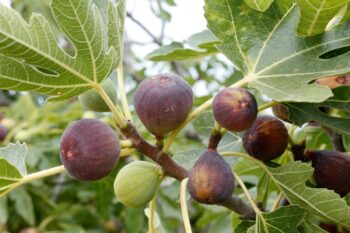Learning from the Fig Tree
 Luke 13:6-9
Luke 13:6-9
“6 He spake also this parable; A certain man had a fig tree planted in his vineyard; and he came and sought fruit thereon, and found none. 7 Then said he unto the dresser of his vineyard, Behold, these three years I come seeking fruit on this fig tree, and find none: cut it down; why cumbereth it the ground? 8 And he answering said unto him, Lord, let it alone this year also, till I shall dig about it, and dung it: 9 And if it bear fruit, well: and if not, then after that thou shalt cut it down.”
Mark 11: 11-14, 20-21
“12 And on the morrow, when they were come from Bethany, he was hungry: 13 And seeing a fig tree afar off having leaves, he came, if haply he might find anything hereon: and when he came to it, he found nothing but leaves; for the time of figs was not yet. 14 And Jesus answered and said unto it, No man eat fruit of thee hereafter for ever. And his disciples heard it.
20 And in the morning, as they passed by, they saw the fig tree dried up from the roots. 21 And Peter calling to remembrance saith unto him, Master, behold, the fig tree which thou cursedst is withered away.
Matt 21:18-20
“18 Now in the morning as he returned into the city, he hungered. 19 And when he saw a fig tree in the way, he came to it, and found nothing thereon, but leaves only, and said unto it, Let no fruit grow on thee henceforward forever. And presently the fig tree withered away. 20 And when the disciples saw it, they marvelled, saying, How soon is the fig tree withered away!”
The first parable reference is with Jesus telling the story of a vineyard owner (God) who has a fig tree. For three years He has been looking for fruit on this tree. He found nothing. So He decides to get rid of it, as it is a waste of space to have a non-producing tree in the ground.
The gardener (Christ) says that He will ‘dig about it and dung it.’ This means, prune and fertilize it. Then if nothing comes of it, it can be cut down and tossed in the fire. 
The other references shared tell of an experience with Jesus and His disciples where He comes up to a real fig tree. This tree has many leaves, yet there was no fruit on it.
The fig tree is a bit different from other trees. It will often begin to bear fruit before the leaves in the spring grow. Here is a tree that appears as if it should be loaded down with fruit since it is full of leaves. But Jesus found no fruit.
He continues on to curse the tree and it withers quickly.
Jesus never performed a miracle without there being a specific spiritual lesson attached.
As in the first parable, Jesus had been walking among men for three years. He has given them plenty of evidence that He was indeed the Messiah, but they continued to reject Him. They refused the evidence before their very eyes. They refused the scripture pointing to the activities Christ performed.
 This cursing of the fig tree is very similar when Jesus said, ‘Your house is left unto you desolate.’ (Matt 23:38)
This cursing of the fig tree is very similar when Jesus said, ‘Your house is left unto you desolate.’ (Matt 23:38)
The Pharisees ‘appeared’ to be righteous. They had created hundreds of extra laws to expand upon God’s law. Their extensions made keeping of the Sabbath a burden. Christ came to demonstrate the spirit of the law. (ie: Lust in heart = adultery.)
There are many additional scripture references expanding on the theme that we are to be fruitful. (Gal 5:22-23) Romans 1:18-22, 24 speaks of those who have head knowledge (hearers), but not heart knowledge (doers). Chapter two continues this in verse 13 that those who are doers of the law will be justified. This chapter is rich with spiritual meat.
If we do not have evidence of God’s work in our hearts, Jesus tells us what happens in Matt 7:21-23. The evidence is not exactly the miracles or the good works. Instead, it is obedience.
If we look at Gal 5: 22-23, we see the fruit of the spirit. This is the evidence of God’s transformational work in our hearts (Rom 12:1-2).
Love is the fulfillment of the law. (Rom 13:8)
When we love, then we will have joy, peace, longsuffering, gentleness, goodness, faith, meekness, and temperance demonstrated in our lives.
1 John 3 goes into more detail on how to demonstrate love to one another. Vs 18 tells us not to ‘love’ merely by our speaking, but by our actions. It is through this love in action that our prayers are answered.
We must be more than verbal ‘android’ Christians. We must live the principles of God’s word in our every day lives. (Isa 58)This leads to the fruit being demonstrated.
When God sees this fruit, He knows we truly belong to Him. (1 John, Ezek 20:12)
 A question to ask ourselves, ‘How are we demonstrating God’s fruit in our lives today? Are we living love in action?’
A question to ask ourselves, ‘How are we demonstrating God’s fruit in our lives today? Are we living love in action?’
Something to think about.